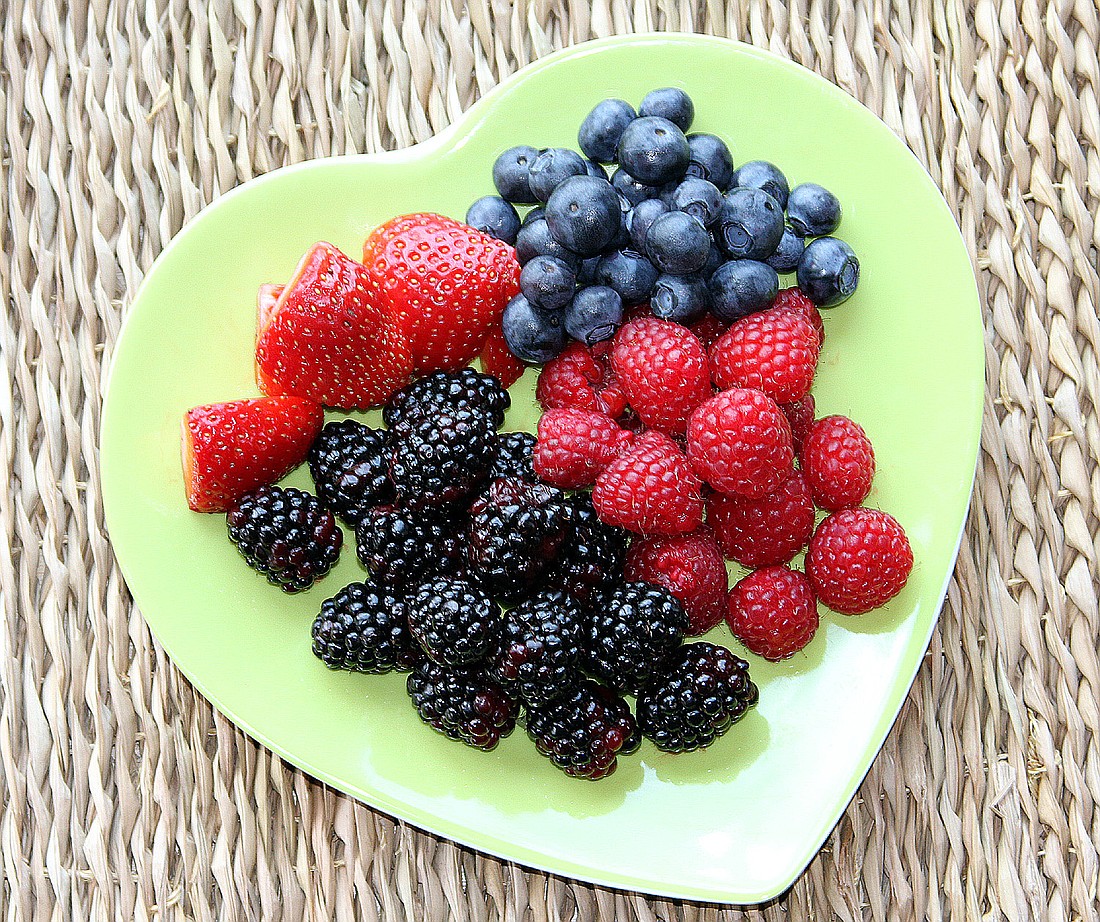- July 26, 2024
-
-
Loading

Loading

February is American Heart Month and since heart disease is the No. 1 killer of women and men in the U.S., it's time to focus on prevention. After all, if you prevent heart disease, you’re very unlikely to die from it.
Here’s a heart healthy formula that just might help save your heart or that of the one you love.
Studies by the National Institutes of Health, Harvard School of Public Health and others have shown that eating three or more servings of strawberries or blueberries a week can lower one’s risk of heart attack by as much as 32%. Grapes, eggplant and blackberries work too.
It’s those flavonoids, the antioxidants you find in red wine, dark chocolate, green tea, apple skin, and, yes, berries.
The rule of thumb is: The darker the color, the more flavonoid content. Flavonoids slow down your aging clock and prevent disease by keeping free radicals from damaging cells in your body.
Free radicals are incomplete molecules looking for an electron so they can complete and stabilize themselves. They steal an electron from a neighboring molecule, turning it into a free radical and setting off a chain reaction that makes lots of free radicals. Sounds like a cheap science fiction movie, but it’s real. They contribute to the aging process and a wide range of diseases.
We form them naturally when we breathe and metabolize. Free radicals don’t wreak havoc with your body until you have too many of them. They can be formed by oxidative stress, like intense exercise, smoking and exposure to environmental toxins.
Enter the flavonoids. They give the free radicals one of their electrons and stop them in their tracks. They help prevent heart disease by stopping LDLs (bad cholesterol) from breaking down and forming plaque in your arteries. They’re great for all kinds of health issues. They even appear to improve cognition. But you can overdo it. You should stick to what a normal vegetarian is likely to consume: from about 120mg to 350mg of flavonoids per day. A single serving (100mg/3.5 oz.) of blueberries or blackberries can contain more than 80mg of flavonoids.
Nowadays, you can get berries year-round, and they are a great low-calorie food alone, in yogurt, or sprinkled on your cereal. So let’s have a few servings of berries, some eggplant, a glass of cabernet and maybe a square of dark chocolate for dessert. Not such a major lifestyle change, and it can help you stay heart healthy too!
But as long as we are talking about prevention, what about stress?
According to the American Heart Association, long-term stress can lead to high blood pressure, heart attack and stroke. Stress can also feed our vices like smoking, junk food eating, a sedentary lifestyle and sleep disorders, all of which increase your cardiac risk.
A series of studies by Columbia University Medical Center say whether we perceive ourselves as stressed can be a measure of the risk we’ll have a heart attack in the future. Stress is everywhere, so some people must be managing it better than others.
My clients who exercise regularly, particularly aerobic exercise, tend to think of themselves as being more relaxed. And they are more relaxed.
Aerobic exercise releases endorphins, the body’s natural tranquilizer, and they know they’re getting the heart benefits of all that cardio. To get the maximum benefit from cardio exercise, most people should build up to at least 30 or more minutes at least five days a week at 60% to 85% of their max heart rate.
If you are just starting out, you can ease in with a few minutes a day at a comfortable pace and add more as it gets too easy. But here is the rub: Aerobic exercise, because it requires so much oxygen, is an oxidative stressor. It produces free radicals.
People who exercise occasionally or hard only on the weekend are more at risk for producing harmful levels of free radicals. But studies have found that people who exercise regularly tend to adapt and produce enzymes that create antioxidants minimizing free radicals’ negative effect, so that helps them stay heart healthy.
So, here is the formula to be heart healthy: Eat berries, drink red wine in moderation and get regular cardio to help protect your heart and release some of that stress harmlessly into the atmosphere. It’s an eclectic concoction, but I think it’s probably tastier than one of those mystery smoothies.